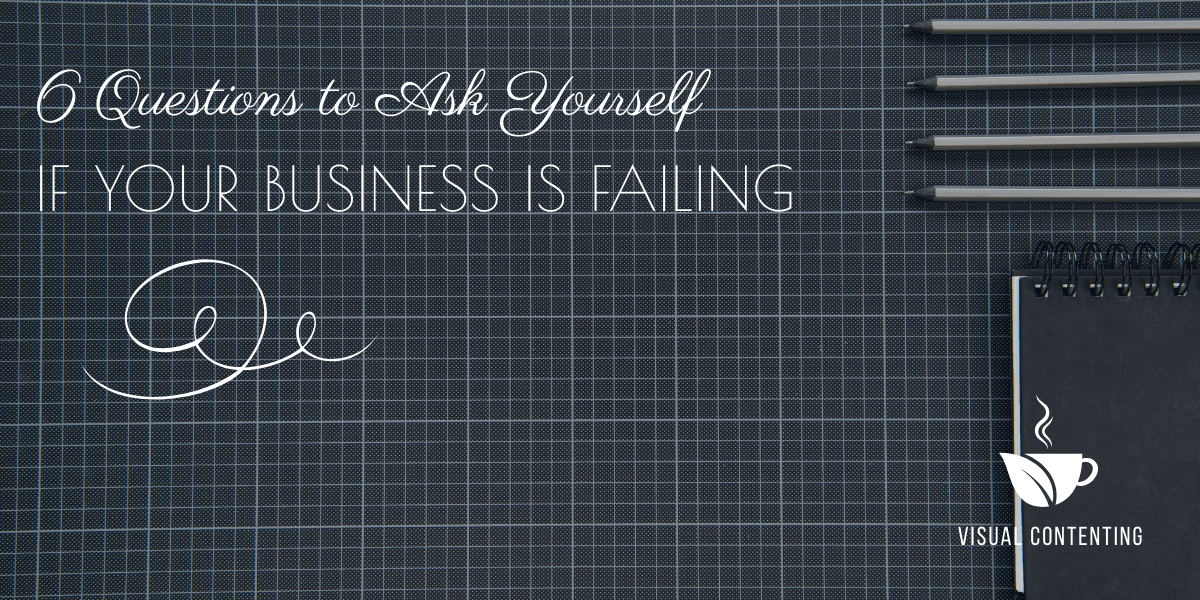Running a small business requires a lot of attention and energy. If that business begins failing, it's heartbreaking because most business owners invest so much of themselves into the process of creating something they're passionate about.
Only 50 percent of small businesses survive to the five-year mark, and a mere 30 percent make it to the 10-year mark. Only 50 percent of small businesses survive to the five-year mark, and a mere 30 percent make it to the 10-year mark. Click To Tweet However, your business isn't only about the numbers. It is a unique company built by you and your dreams.
Even if your business is failing at the moment, there are some questions you can ask yourself to help you get back on track and beat the odds.
1. Why Did You Start the Business?
Reconnect with your passion for the brand. What was the reason you initially started your business? Most people point to a situation which inspired them or a desire to help others with a product or service.
However, over time, it's easy to lose sight of the passion and focus only on the numbers. If you aren't happy with your chosen career of running your business, it shows, and it may result in lackluster advertising campaigns, sales pitches which fall flat and a lack of creativity. If this happens to you, try the following:
- Take some time to figure out how to reconnect with what you love about your business. Think about the person or situation that initially inspired you.
- Look back at your original business plan and vision and evaluate how far you've strayed from it.
- Think about the reason you started your business in the context of your life today. Consider what has changed about your life and what's still the same.
Gaining a fresh look at your original perspective allows you to revamp what you're doing and get the right message out about your brand.
2. Are Your Employees Fully Trained?
As many as 62 percent of consumers say customer service representatives' knowledge is vital to good customer experience (CX). As many as 62 percent of consumers say customer service representatives' knowledge is vital to good customer experience (CX). Click To Tweet When your business grows rapidly, you may feel you don't have enough time to train new employees fully before they start working with customers. To combat this issue, try these strategies:
- Offer ongoing training. While you might not have time for a week-long training camp, you can find an hour once or twice a week to work on elements of quality customer service.
- Create a reward system for employees who seek training on their own time.
- Spend time teaching employees your customer philosophy and company policies.
3. Is Your Product Reliable?
Have you ever purchased a product that broke in mere minutes and the company's customer service refused to make things right? You're unlikely to buy from that brand again.
On the other hand, you may have bought an item which exceeded expectations from a company whose customer service was on point. That's a recipe for a loyal customer.
If your product isn't reliable, you'll not only lose customers, but they will tell others, complain on social media and your business reputation will suffer. To make sure your product makes a good impression, try these tips:
- Conduct testing and fix any failure points in your product or service.
- Poll customers about their satisfaction with your product's reliability.
- Offer a guarantee that backs up your claims about your product and keeps you accountable.
With a little work, you can improve any past reliability issues and gain a positive reputation for quality.
4. Did You Grow Too Fast?
About 22 percent of small and medium businesses cite cash flow as one of their major issues. If your business grows rapidly, it can be hard to scale without running into cash flow issues. Say, for example, that you run a clothing store and want to open a second location. You'll have to buy a large amount of clothing but wait until the store opens and customers start coming in to make money back. This creates a cash flow crunch. If this happens to you, ask yourself the following questions:
- Were you truly ready to expand your business?
- Is the expansion costing you more money than it's earning you? How long will this scenario last, and can you afford it?
- Did you add too many additional products or services which don't relate to your original purpose?
Take the time to reassess your growth and keep only those elements which will become profitable in a reasonable amount of time.
5. What Is Going on with Your Competition?
If you built a successful business model, it's only natural others will try to repeat your success. You may have more competition than when you first started and a smaller customer base. These strategies can help you adjust to a business landscape with more competition:
- Evaluate every aspect of the competition. Send someone to be their customer and figure out what they do well and what their weaknesses are. You must be at least as good as they are in their strong areas and excel where they are weak.
- Figure out your unique value proposition (UVP). What makes your brand stand out from every other brand out there?
- Up your marketing. Advertise where your competitors advertise, so consumers know they have an option.
To stay ahead of the competition, you must understand your target audience and figure out unique ways of getting the story of your brand out to the general public.
6. Are You Generating the Right Leads?
No matter what type of business you run, if you don't focus on the right prospects, you won't convert leads into customers. Start by developing a buyer persona - a pretend character representing your typical customer. Think about the following questions:
- If the buyer persona entered your store or visited your website, what would attract and repel them?
- Do your calls to action (CTAs) speak to your target audience and explain how you'll solve a pain point?
- How do you vet your leads so only the ones most likely to buy from you make it through?
If you generate highly targeted leads, your sales team can focus exclusively on converting people who are already interested in your product into customers.
Don't Panic
When your business struggles, it's easy to let panic set in. Take a deep breath and evaluate where you are in different areas of your business. Look for places where you're overspending or wasting resources and then go through the questions above to get your brand back on track and become one of the many small business success stories.
Related Posts
Lexie is a designer and typography enthusiast. She enjoys writing HTML code and creating new styles guides. In her spare time, she works on her design blog, Design Roast.







